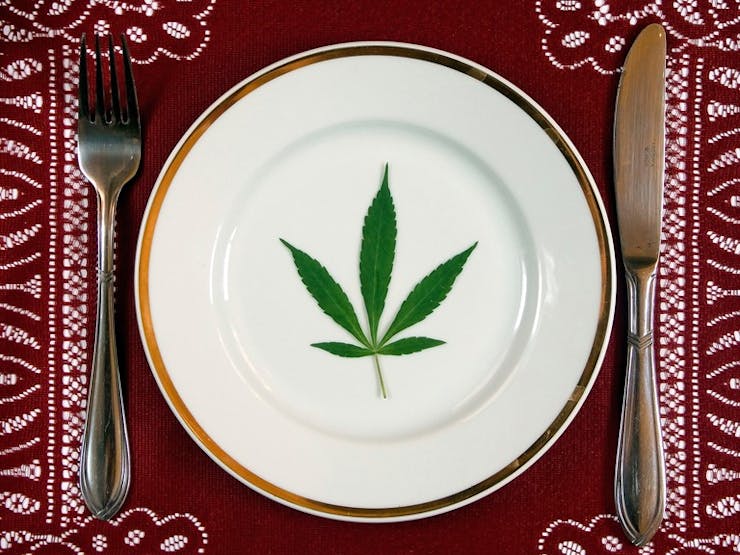If there’s one activity that is truly made better by cannabis, it’s eating. We’ve all experienced it: every flavor seems new, like you’re tasting it for the very first time. The less-than-average cook suddenly become a culinary genius—who knew granola, vanilla ice cream, and raspberry jam could be so good? Your stomach seems bottomless—did you really just eat a whole calzone and two slices of chocolate cake?
Though some people may feel disgusted with themselves after a canna-induced feast, others revel in the pure satisfaction of a full stomach. Regardless of the bloat, we’d like to take the time to properly honor our favorite herb and our favorite pastime.
So, without further ado, here are three fun facts about cannabis and eating:
1. THC Makes Food Smell and Taste Better

Apparently, cannabis causes food to smell so good that you just have to eat it. A new study published by Nature Neuroscience has found that THC, the active ingredient in cannabis, stimulates the olfactory bulb, or the part of the brain responsible for recognizing scents.
Using mice as test subjects, researchers found that THC molecules fit nicely into receptors on the olfactory blub. The THC supercharged the smell-detecting ability of mice, enticing them to eat more food because the scent was simply irresistible.
2. Cannabis Makes You Love the Experience of Eating

Another recent study published by Neuropharmacology found that cannabis may cause the relationship between you and your food to become a little more intimate. Eating foods that you like naturally increases dopamine, the pleasure hormone, in your body. Yet, when THC is present, your body receives an extra jolt of dopamine from what you’re eating.
Shop highly rated dispensaries near you
Showing you dispensaries nearTHC’s ability to make you love your food even more than normal might be connected to the fact that the same compound also allows you to smell and taste food more acutely, meaning everything you taste becomes extra delicious and therefore all the more pleasurable.
3. THC May Actually Stimulate Hunger

So far, we’ve learned that THC makes food smell better and more pleasurable to eat. Yet, to top things off, research published in the Journal of Biological Chemistry (JBC) has found that the cannabinoid also increases ghrelin, one of the hormones responsible for creating the sensation of hunger that plays a part in the metabolization of carbohydrates. When THC is present in the body, levels of ghrelin increase, causing you to feel hungry and crave carbohydrate-rich substances.
The JBC study also found that cannabinoids, when bound to CB-1 receptors in the hypothalamus, increase activity levels of the enzyme AMP-activated protein kinase (AMPK). AMPK is the grandmaster for metabolic regulation. It's the enzyme that transforms glucose and fatty acids into forms that can be used for energy by cells.
Simply stated: THC causes you to feel hungry by releasing hunger-hormones while simultaneously jump-starting your metabolism by stimulating AMPK.
Speaking of jump-starting your metabolism, if you're interested in pairing cannabis with some serious eating this weekend, here are some high THC strains you can try that'll get your tummy rumbling:
Well, there you have it. Marijuana and food are like two peas in a pod. After a little cannabis, food tastes better, eating brings you more pleasure, and THC helps your body rev up for a massive chow-down. What's not to love?
Learn more about the science behind "the munchies" and why cannabis stimulates your appetite:
Photo credits: ArmandoH2O; thebittenword.com; Tabsinthe; Chacon Foto Photography By Rafael Chacon via photopincc






